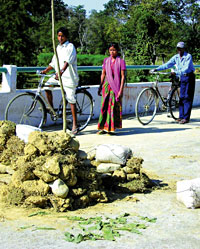|
|
The next logical step is to convince the Maoists to declare another ceasefire which would not just reinforce the parties' peace brokering role but also prevent the royal regime from using the conflict as an excuse for further militarisation and absolutism. More importantly, a ceasefire call is critical for the success of the planned pro-democracy rally on 7 April.
Then the parties and the Maoists have to get down to real brass tacks and tackle the issue of violence. There is no more rationale for the kind of bloodshed we have seen this week. The Maoists must think twice about their planned big strike in the capital because it will play right into the regime's hands and wreck the pact with the parties. Learning from the permanent ceasefire declared by ETA this week, the comrades must realise that armed struggle is a dead end. By pledging to the parties that they are committed to renouncing violence they get their safe landing and take the wind out of the king's sails.
Critics of the pact are partly right: violence and non-violence don't mix. The Maoist blockade that crippled the country has been swapped for a crippling four-day national shutdown 5-9 April called by the seven party alliance. And we are supposed to be thankful.
A national shutdown is not a non-violent protest. It depends on the threat of violence to keep cars off the roads and shops shut. Abductions, extortion, blockades and closure of community-managed schools are also forms of violence.
If the political parties are still wondering why the people aren't coming out openly in the streets in support of their pro-democracy agitation they just need to re-evaluate the decisions that prove the people's worst fears that they haven't changed their spots.
Why is it that the king's enemies insist on punishing the people to get back at him? How is it going to help build public support when you deprive the poorest segments of society from their livelihoods for prolonged periods?
It is this country's tragedy that people fighting to liberate the people have always punished the very people they're supposed to liberate.



